Posts Tagged ‘Boston’
Commercial Truck Accidents Cause Thousands of Deaths Each Year
 A tractor-trailer overturned and caught fire this morning in Fall River, causing major traffic delays on Route 24 as well as evacuations.
A tractor-trailer overturned and caught fire this morning in Fall River, causing major traffic delays on Route 24 as well as evacuations.
The tractor-trailer, which was transporting 11,000 gallons of gasoline, overturned near Exit 5 northbound. Police report the driver was sent to Rhode Island Hospital with non-life threatening injuries. The truck was owned by J.P. Noonan of West Bridgewater. No other vehicles were reportedly involved. At this time, the cause of the truck accident is under investigation.
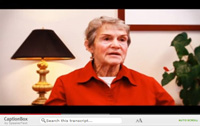 The trial lawyers of Breakstone, White & Gluck have extensive experience representing individuals who have been seriously injured in tractor-trailer accidents. Recently, we have obtained $3 million for a woman who was hit head on by an inattentive operator of an 18 wheeler. Below, an online review from another recent client who was rear-ended by a tractor-trailer and seriously injured:
The trial lawyers of Breakstone, White & Gluck have extensive experience representing individuals who have been seriously injured in tractor-trailer accidents. Recently, we have obtained $3 million for a woman who was hit head on by an inattentive operator of an 18 wheeler. Below, an online review from another recent client who was rear-ended by a tractor-trailer and seriously injured:
Today’s accident points to the fact that truck accidents are too common on our roads. In 2014, Massachusetts has already seen at least two serious tractor-trailer accidents, including one last week on the Mass Turnpike in Palmer and another in Oxford earlier this month.
The Oxford accident sent two people to the hospital with life-threatening injuries. In 2012, over 3,500 people died in large truck crashes in the U.S., according to the Insurance Institute for Highway Safety (IIHS). The majority – 67 percent – were passenger vehicle occupants. Truck occupants accounted for 17 percent of deaths and the remaining 15 percent of deaths were pedestrians, bicyclists and motorcyclists.
Truck drivers have special licensing requirements and regulations to follow. Trucks are harder to control than passenger cars and have much longer stopping distances. According to IIHS, loaded tractor-trailers take 20-40 percent farther to stop than cars and even more distance in poor weather conditions or if a truck has poorly maintained brakes.
To prevent driver fatigue, drivers of large trucks must follow federal regulations restricting their time behind the wheel. They are subject to federal hours-of-service regulations, a maximum of 11 hours of driving after 10 consecutive hours off-duty, according to the Federal Motor Carrier Safety Administration.
Truck companies must also follow regulations for inspection, repair and maintenance of their vehicles and not operate any vehicle which is likely to cause an accident or breakdown.
Attorney David White Discusses Product Recalls on Fox 25 TV
Last weekend, two young children in Franklin tragically died after getting trapped in a defective wooden hope chest during a game of hide and seek. The chest was one of 12 million manufactured by the Lane furniture company of Virginia between 1912 and 1987.
Attorney David White from the Boston product liability firm, Breakstone, White & Gluck, commented on ways consumers can avoid injuries from defective products, including second-hand goods.
According to reports, the Franklin children were probably playing a game when they got into the chest and the lid closed. The lid automatically latched shut when closed and could not be opened from the inside. When the family purchased the second-hand chest 15 years ago, they had no warning of the defect or the fact that the product had been recalled.
Boston News, Weather, Sports | FOX 25 | MyFoxBoston
The chests were recognized as defective after four children were trapped in them and died prior to 1996, leading to a product recall 1997. In 2001, Lane paid a $900,000 civil penalty to the Consumer Product Safety Commission (CPSC) to settle claims that it had provided late notice of the deaths to those four children.
Even after the recall, probably six million of the chests still have the defective locks. Although there have been sporadic efforts to notify the public of this widespread and serious hazard, it is not clear how aggressively Lane has tried to make sure the defective latches are either removed or replaced.
White, a Boston attorney who specializes in injury and liability cases, said companies have a responsibility to inform clients of recalls and stores have a responsibility not to sell recalled products, but sometimes consumers still do not receive notice, including in cases involving products purchased in second-hand stores. He said defective products are causing injury.
White told Fox 25 that the problem is no one registers a hope chest with a company as they would an electronic product such as a new television. His safety tips:
1) Consumers can learn what hazard signs to look for in products and remove unsafe products on their own, even if they have not been recalled.
2) A few products to watch carefully:
- Cribs, car seats, bassinets, strollers and other products which hold babies.
- Products with small pieces that break off.
- Novelty toys with magnets which children can easily swallow. These have been recalled.
3) Consumers can check the CPSC website for recalls.
4) Read age-appropriate labels on toys. Your younger children may not be old enough to play with their older siblings’ toys.
Read More
What Target Shoppers Can Do Following Massive Data Breach
 If you are a Target shopper, you are likely watching your debit or credit card account closely these days. This is a good start, but there are other important steps you can also take following the retailer’s massive data breach, now estimated to have impacted at least 70 million customers. The data breach occurred at Target’s retail stores between Nov. 27 and Dec. 15. Hackers stole customer names, credit and debit card numbers, the card’s expiration date and CVV, the three-digit security code. Online holiday shoppers were not involved.
If you are a Target shopper, you are likely watching your debit or credit card account closely these days. This is a good start, but there are other important steps you can also take following the retailer’s massive data breach, now estimated to have impacted at least 70 million customers. The data breach occurred at Target’s retail stores between Nov. 27 and Dec. 15. Hackers stole customer names, credit and debit card numbers, the card’s expiration date and CVV, the three-digit security code. Online holiday shoppers were not involved.
What to do if you were impacted:
Monitor your accounts. Be vigilant and monitor all your financial accounts regularly over the next 12 to 24 months. If you notice any irregular activity, notify the credit card issuer or your bank immediately.
Make contact now. Ask your bank or credit card company’s fraud department to also closely monitor your account.
New card and account number. Ask your bank or credit card company about changing your pin number and whether you should have a new card issued.
Contact Target. The company says customers have zero liability for any fraud resulting from this data breach and are offering free credit monitoring and identity theft protection for impacted customers. Learn more.
Obtain your credit report. You are entitled to one free credit card report each year from one of the three major credit bureaus, Equifax, Experian or TransUnion.
One-call fraud report. Call any of the three major credit bureaus and place a one-call fraud alert on your credit report. This requires creditors to contact you before opening any new accounts or increasing your credit card limits. The fraud alert will stay on your account for at least 90 days.
Extended fraud alert. If your credit report reveals suspicious activity, you can file a report with your local police department and have an extended fraud alert placed on your credit report. This will provide additional protection for seven years.
Security freeze. You also have the right to place a security freeze on your consumer credit report. This stops consumer-reporting agencies from releasing any information in your credit report without your express authorization.
Beyond the financial risk, identity theft can create many hours of work for victims trying to straighten out accounts and identify where breaches occurred. Read the resources below to learn how to protect yourself.
Related:
Identity Theft, Federal Trade Commission.
Lost or Stolen Credit, ATM, and Debit Cards, Federal Trade Commission.
Protecting Against Credit Card Fraud, Federal Trade Commission.
Read More
Dietary Supplements Are Not a Cure for Concussions, FDA Says
 The Food and Drug Administration (FDA) is warning parents and others concerned about sports concussions that certain dietary supplement makers are making false claims.
The Food and Drug Administration (FDA) is warning parents and others concerned about sports concussions that certain dietary supplement makers are making false claims.
The FDA issued a Dec. 31 warning, advising consumers to avoid dietary supplements claiming to prevent or treat concussions and other traumatic brain injuries (TBI). The common claim is the dietary supplements promote faster healing times after a head injury. But the FDA said there is no scientific evidence to support this claim and it has the potential to cause serious injury. Athletes who return to play too soon because they believe they are cured risk long term health consequences. Repeated injuries which do not fully heal can cause brain swelling, permanent brain damage and long-term disability. They can also be fatal.
Over the past several years, many states have passed legislation to protect student athletes and professional sports leagues have made changes to protect players. In August, the National Football League (NFL) reached a $765 million settlement with 4,500 former players who suffered long-term injuries from concussions. Some of the money will help fund new research into chronic traumatic encephalopathy (CTE). This condition, which causes mental impairment, aggression and dementia, is linked to repeated hits to the head. But it can currently only be diagnosed after death.
In its recent update, the FDA also broadly warned consumers about all products labeled as dietary supplements which are marketed to cure, mitigate, treat or prevent disease. Dietary supplements are regulated differently than other food products and drugs.
There are over 85,000 supplements available today, but they require no approval before going to market. Under the Dietary Supplement Health and Educational Act, the manufacturer is responsible for ensuring a product is safe before going to market and the FDA can take action against any unsafe product after it starts being sold.
Dietary Supplement Companies
In this case, the FDA acted on a tip from the U.S. Department of Defense and conducted market surveillance. It found two companies making improper claims: PruTect Rx of Highlands Ranch, Colorado and Trinity Sports Group Inc. of Plano, Texas. It issued warning letters in September 2012 and both companies changed their websites and labeling.
But in December 2013, the FDA had to warn a third company, Star Scientific, Inc. for marketing a product called Anatabloc with claims to treat TBIs.
Consumer Warning
The FDA said consumers may come across these dietary supplements on the Internet, social media sites such as Facebook and Twitter and retail outlets. They often promise to heal TBIs with ingredients such as turmeric, an Indian spice, and high levels of omega-3 fatty acids derived from fish oil.
Related:
Can a Dietary Supplement Treat a Concussion? No., FDA Update.
Dietary Supplements, FDA.
Read More
More than 33,000 Child Car Seats Recalled
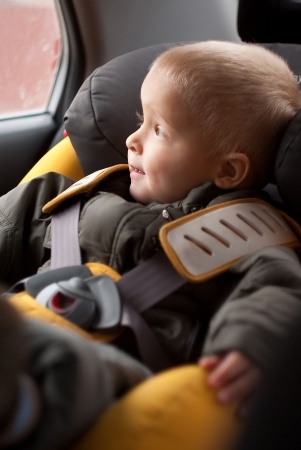 Combi USA announced a recall of over 33,000 car seats last week and said parents should expect repair kits starting in February.
Combi USA announced a recall of over 33,000 car seats last week and said parents should expect repair kits starting in February.
Combi USA recalled its Coccorro, Zeus, Turn and Zeus 360 models made through January 2013. The National Highway Traffic Safety Administration (NHTSA) reports the seat straps do not meet minimum requirements. Children may not be properly secured in case of a car accident.
The Charlotte, N.C. company said one part of the harness failed strength tests, but the harness as a whole meets safety standards. Seats made after January 2013 do not have this defect.
Combi USA will notify owners who have registered their products and mail out free harness replacement kits starting in February.
What to Know About Child Safety Seats
Choosing a safe car seat and learning how to properly install it is a struggle for many parents. There are a number of resources to help make the process easier.
Product Recalls.The Consumer Product Safety Commission (CPSC) website provides updates on product recalls. This recall was reported in the media and not listed on the website, but most recalls can be found there.
NHTSA. The National Highway Traffic Safety Administration provides online resources about child seat safety ratings.
State of Massachusetts. In Massachusetts, children must use some type of child passenger safety seat until they are 8 years old or weigh 57 pounds. All seats must meet federal standards. Read what types are appropriate for each age.
Local Police Departments and Organizations. Your local police may have an officer who has been specially trained to fit car seats. This is a free service.
Related:
Combi USA Recalls More than 33,000 Child Seats, ABC News.
Read More
After a Child’s Death, Nearly 3 Million IKEA Children’s Lamps are Recalled in U.S.
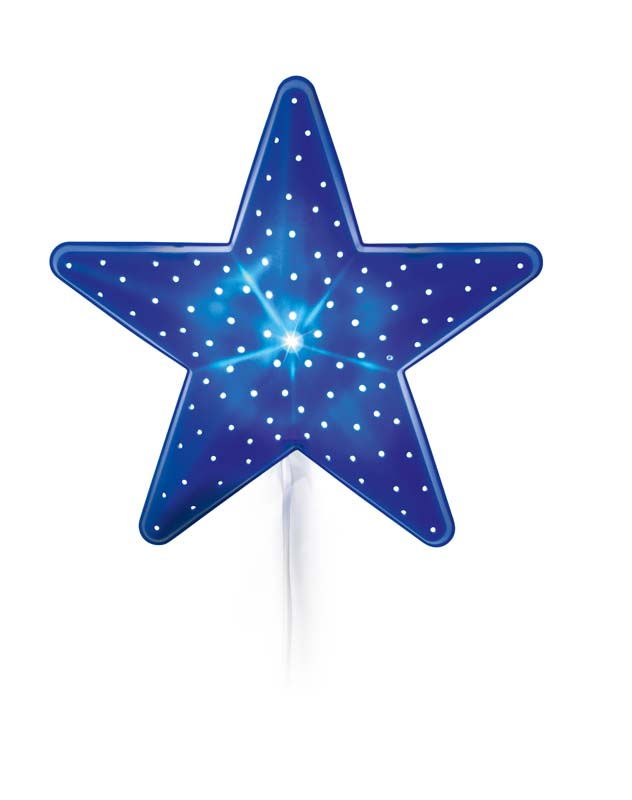 Parents who shop at IKEA should be aware of a far-reaching product recall involving a children’s lamp which has been blamed for a 16-month-old’s death.
Parents who shop at IKEA should be aware of a far-reaching product recall involving a children’s lamp which has been blamed for a 16-month-old’s death.
On Dec. 11, the Consumer Product Safety Commission (CPSC) announced the recall of IKEA children’s wall mounted lamps sold from July 1999 through May 2013. A total of 23 million of the SMILA-series wall mounted lamps were sold around the world. Of these, 2.9 million were sold in the United States and 1.1 million in Canada.
The recall follows two tragic incidents in Europe. In one case, a 16-month-old child in a crib died after becoming entangled in the lamp’s cord. In another incident, a 15-month-old became entangled in the cord and was nearly strangled.
Consumers are instructed to stop using the recalled lamp and contact IKEA for a free repair kit.
The lamps were recalled by IKEA North America, of Conshohocken, Pennsylvania. IKEA is a Swedish company which sells home furniture. The company has 340 IKEA stores in 42 countries. The company has 38 stores in the United States, including one on Route 24 in Stoughton, which opened in 2005. This is the only Massachusetts IKEA store.
The defective wall lamps were sold in eight designs through IKEA’s stores, catalog and ikea-usa.com for between $10 and $13.
What Consumers Should Know
Here is the IKEA lamp recall notice. The lamp was sold in eight designs, including a blue star, yellow moon, pink flower, white flower, red heart, green bug, blue seashells and an orange horse. The lamps are about 11 inches by 11 inches and have a seven-foot long electrical cord. Model numbers are included in the recall notice.
Parents who contact IKEA for a repair kit will be given self-adhesive fasteners to attach the lamp’s cord to the walls along with safety instructions.
Recalls Related to Children
Each year, the CPSC announces recalls dozens of dangerous toys. For 2012, the agency estimates that toy-related injuries resulted in 192,000 visits to U.S. hospital emergency rooms.
The dangers poorly made toys can pose is well known and always in the spotlight around the holiday shopping season. But the public often overlooks the dangers in other children’s products, which are often used even more frequently than toys. In 2013, a number of defective children’s products were recalled, including bunk beds which posed an entrapment risk, children’s utensils, children’s hooded sweatshirts with drawstrings, pajamas and baby strollers. See the link below to learn more.
Related
Summary of 2013 product recalls, Safe Kids Worldwide
IKEA Recalls Children’s Wall-Mounted Lamps Due to Strangulation Hazard; One Child Death Reported, Consumer Product Safety Commission.
Read More
December Product Recalls Include Holiday Decoration, Baby Carrier
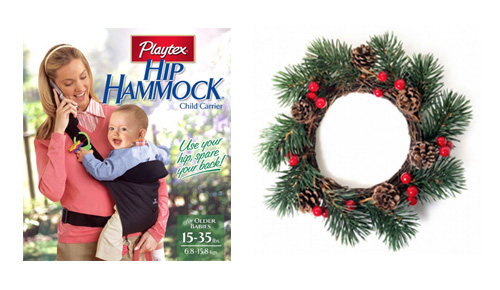 The Consumer Product Safety Commission (CPSC) announced several recalls last week, including a popular holiday decoration and two children’s products. The commission also announced its annual list of winter-related products which were recalled during other seasons.
The Consumer Product Safety Commission (CPSC) announced several recalls last week, including a popular holiday decoration and two children’s products. The commission also announced its annual list of winter-related products which were recalled during other seasons.
Yankee Candle Ring
The Yankee Candle Company recalled about 15,000 pine berry candle rings in the U.S. and 2,000 in Canada. They pose a fire risk because of the synthetic foliage, berries and cones ornamentation. No injuries have been reported. The recalled rings were sold in Yankee Candle and Hallmark stores nationwide from September 2013 through October 2013. They were sold for between $8 and $10 at these stores, as well as through Yankee Candle catalogs and Yankeecandle.com. Consumers are asked to return candles to the nearest Yankee Candle store for a full refund. See the CPSC recall notice.
Playtex Hip Hammock Infant Carriers
Playtex is offering parents a full refund after recalling a baby hammock-style carrier. Playtex Hip Hammock infant carriers were recalled because they pose a fall hazard to children. About 305,000 baby carriers were recalled in the U.S. and 36,000 in Canada.
The company received 87 reports of the product’s buckles cracking or breaking. Two reports involved injuries, including one infant who required care at a hospital emergency room.
Consumers are instructed to stop using the carrier and contact Playtex for a full refund. These carriers were sold from June 2004 to December 2008 in the U.S. and through January 2010 in Canada. Purchase price was about $40 for the basic model and about $60 for the deluxe model.
In the U.S., the baby carrier was sold at Burlington Coat Factory, Target, Amazon.com and other baby and discount stores.
The carriers are designed for children 15 to 35 pounds and are made of a suede fabric in black and navy. They have black, black and white check and burgundy lining on the inside. Read the CPSC recall notice for model numbers.
Cubetensils Children’s Eating Utensils
Edoche Inc. recalled about 1,100 children’s spoon and fork sets because the handle can detach, posing a choking hazard for infants. The Seattle, Wash. company received one report of a handle detaching and a baby putting it in their mouth. No injuries were reported.
The utensils were sold in seven different designs and patterns from May 2012 through November 2013 for about $8 per set. They were sold at retailers and specialty stores nationwide, along with Amazon.com and ebay.com. Consumers can contact Edoche for a full refund. Read the CPSC recall notice for more information.
Consumer Product Safety Commission Website
If you have never used this website, it is a great tool to become familiar with in the New Year. You can find the latest product recalls and more information about ones you learn about in the news. But often, product recalls are not picked up by the news media so it is important to seek out the information yourself periodically. If you use Facebook, you can also stay up-to-date by following our page, where we often report on recalls.
Boston Massachusetts Personal Injury and Medical Malpractice Lawyers | Promote Your Page Too

Here is one page from the CPSC website which may help you now: “Check for These Winter Products Recalled Last Summer.”
Read More
Drivers Age 25-39 Admit to Most Texting While Driving
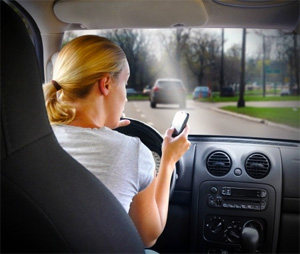 One in four drivers admitted to texting while driving in the past month, a new AAA survey reports. While teenagers often get the most blame, this survey found drivers age 25-39 are actually the worst offenders.
One in four drivers admitted to texting while driving in the past month, a new AAA survey reports. While teenagers often get the most blame, this survey found drivers age 25-39 are actually the worst offenders.
Texting while driving is against the law in Massachusetts and 40 other states. But in the new survey, 26 percent of drivers reported sending a text or e-mail while driving in the past month. Among drivers age 25-39, 45 percent admitted to texting or sending an e-mail while driving and 10 percent admitted they did so fairly often.
These drivers were also most likely to drive while talking on a handheld cell phone, with 82 percent admitting to doing so in the past month and 43 percent saying they did it fairly often. Talking on a cell phone while driving is still legal in many states, including Massachusetts, but legislation is pending to restrict that activity.
Drivers 19-24 were second most likely to text while driving, with 42 percent confessing to it at least once in the previous month and 11 percent saying they did it fairly often.
Drivers age 16-18 were third most likely, followed by drivers ages 40-59, then 60 and older. Drivers age 75 and older were the least likely, but even one percent of them admitted to texting and 31 percent admitted to talking on a handheld cell phone while driving in the previous month.
A few notes:
- One out of 10 fatal car crashes involves distraction, resulting in more than 3,000 deaths per year in the U.S.
- At any given daylight moment, approximately 660,000 drivers in the U.S. are using cell phones or manipulating electronic devices while driving, according to the National Highway Traffic Safety Administration (NHTSA).
- Using a cell phone while driving quadruples your chance for being involved in a car accident, according to AAA.
- Talking on a handheld cell phone is banned in 12 states and the District of Columbia. It is legal in Massachusetts and the rest of New England. Cell phone use is restricted for novice drivers in 37 states and the District of Columbia.
- Texting while driving is banned for drivers in 41 states and the District of Columbia, including Massachusetts. It is also banned in other New England states. Six other states have bans prohibiting novice drivers from texting.
- Using hands-free devices or infotainment systems is not safer than using handheld cell phones or texting, according to a study by a University of Utah research team. The study last summer tested voice-to-text technology which allows drivers to talk on the phones, send texts and e-mails and use social media without touching a cell phone. The study measured driver alertness using cameras mounted inside the vehicle and diagnostic tools to measure reaction time and brain activity.
- Researchers ranked voice-to-talk technology as more dangerous than using a handheld cell phone and listening to a radio.
Related:
Map of handheld cell phone bans, Insurance Institute for Highway Safety
Hands-free talking, texting is unsafe, University of Utah
Teens report texting or using phone while driving significantly less often than adults, AAA Read More
Massachusetts Property Owners Have a Legal Responsibility to Clear Snow and Ice
If you are a property owner, today is a good time to inspect your driveway and walkways. Even if you worked hard to clear all the snow yesterday, go out and take a second look. The deep freeze is setting in and more snow is forecast for tomorrow, creating the potential for slip and fall accidents.
Why is this important? In addition to making it easier for your family to come and go from your home, you have a duty to use reasonable care to clear snow and ice under Massachusetts law. If you neglect this, you could be liable for any injuries that result.
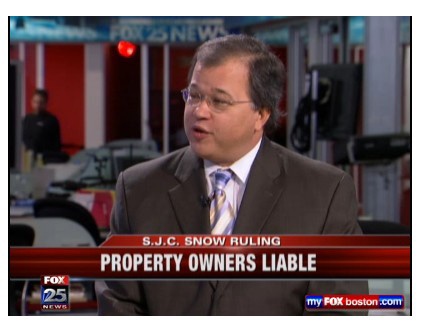
Massachusetts Law on Snow and Ice Removal The law for clearing your property is more strict than in past years. It changed in 2010, with the Massachusetts Supreme Judicial Court’s decision in Papadopoulos v. Target Corporation, SJC-10529 (July 26, 2010). View TV interviews from 2010/2011 in which attorney David White explains the law.
Prior to then, property owners were liable for injuries sustained on what was known as “unnatural accumulations” of snow or ice. Examples of this are gutters leaking onto sidewalks or snow piled on sidewalks.
The state’s high court changed the longstanding law so it falls in line with other states. Massachusetts property owners now have a responsibility to keep their premises in a reasonably safe condition and clear all snow and ice, whether it is a natural accumulation by Mother Nature or pushed there by a plow.
This law applies to homeowners as well as commercial property owners.
A few points to remember when it snows:
- You have a responsibility to clear your driveway, sidewalks and other areas accessible to the public.
- If you are using a snow blower, remember a shovel for narrow and hard-to-reach areas.
- Do you have the physical ability and time to clear your snow this year? If not, consider contacting a snow removal company.
- Cities have responsibility for clearing sidewalks, but some have ordinances requiring residents to clear their own. These include Boston, Worcester and Newton.
Safety
We all have to balance our legal responsibility to clear the snow with safety. It is hard work and tempting to take shortcuts at times. Remember a few basic safety rules. Do not start your snow blower in your garage or other covered areas. Before you shovel your driveway, clear your home’s heating vents so carbon monoxide does not build up in your home. Then, make sure you dress in layers and take breaks as needed.
Related:
Snow removal law may face test, Boston Globe, Dec. 25, 2010.
Read More
Watch Out for This Recalled Children’s Toy
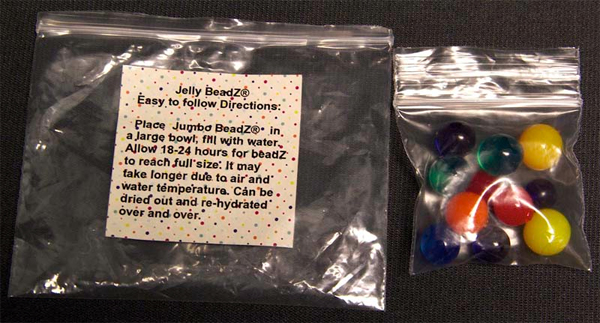
The Consumer Product Safety Commission (CPSC) announced several product recalls last week, including one for a dangerous child’s toy which can cause choking and which has been involved in a death. Also recalled were a high-end bicycle with defective brakes and a flat screen television which can overheat and catch on fire.
Doodlebutt Recalls Jelly BeadZ Jumbo BeadZ and Magic Growing Fruity Fun Toys Due to Serious Ingestion Hazard
About 1,500 of these small water-absorbing toys have been recalled by the importer, Doodlebutt of Lehigh Acres, Florida. The Jumbo BeadZ toys are marble-sized water absorbing balls and the Magic Growing Fruity Fun toys are water-absorbing polymer shapes, such as apples, bananas, butterflies and cherries.
The CPSC is aware of one incident in which an 8-month-old girl ingested the ball and it had to be surgically removed and two cases outside the United States, including one resulting in death.
The CPSC warns children can mistake the toys for candy and when swallowed, they can expand inside a child’s body. The toys can absorb 300 to 500 times their weight and grow up to eight times their original size. Children can suffer vomiting, dehydration and life-threatening injuries. Another problem is similar toys have not shown up on x-rays.
The toys were sold through Amazon.com from February 2012 to September 2013 for about $9. Consumers are advised to take the products away from children immediately and stop using the product. They can contact Doodblebutt for a full refund. Read the CPSC recall notice.
Eight Retailers Recall 32″ Coby Flat Screen Televisions Due to Fire and Burn Hazards
Eight retailers have recalled the 32″ Coby Flat Screen Television due to fire and burn hazards. These retailers have initiated the recall because Coby USA, the product importer and distributor, has gone out of business.
The CPSC has received reports of six incidents involving televisions overheating, smoking or catching on fire. No injuries were reported, but there was some property damage. In two cases, televisions caught on fire and one also scorched a wall.
Consumers are told to turn off and unplug the televisions and contact their retailer. Retailers may offer different remedies, which may include a refund, store credit, gift card or replacement TV. About 8,900 of the televisions were sold through:
Sears/Kmart
Toys R Us
ABC Warehouse
Fry’s Electronics
h.h. Gregg
Nebraska Furniture Mart
P.C. Richard & Son.
Online retailers
BestBuy.com dealtree.com
techliquidators.com
bestbuy.dtdeals.com
The televisions were sold nationwide from August 2011 through November 2013 for between $170 and $260.
Read the CPSC recall notice for the model numbers involved in this recall.
Trek Recalls Madone Bicycles Due to Crash Hazard; Front Brake Can Fail
Trek has recalled several models of its year 2013 Madone bicycles after five reports of loose front brake attachment bolts. No injuries have been reported, but consumers are advised to stop using the bicycle and take it to a Trek dealer for a free replacement front brake system. The bicycles were sold nationwide from July 2012 through this month for between $3,400 and $6,300 and for custom models, up to $15,000. About 6,300 bicycles are involved in this recall. Read the CPSC recall notice.
Other Recalls:
Shaws Industries Recalls Carpet Due to Fire Hazard; Sold Exclusively at Lowe’s Stores
Hobby Lobby Stores Recalls Accent Chairs Due to Risk Injury
Read More

